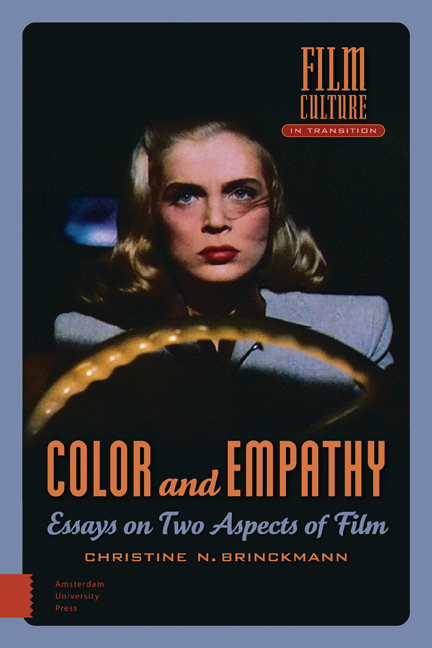Book contents
- Frontmatter
- Contents
- Preface
- Dedication
- Cinematic Color as Likeness and as Artifact: [2001]
- Chords of Color: [2006]
- The Tension of Colors in Colorized Silent Films: [2001]
- Structural Film, Structuring Color: Jenny Okun's Still Life: [1995]
- Desert Fury: A Film Noir in Color: [2012]
- The Work of the Camera: BEAU TRAVAIL: [2005]
- Empathy with the Animal: [1997]
- Motor Mimicry in Hitchcock: [1999]
- Abstraction and Empathy in the Early German Avant-garde: [1997]
- The Role of Empathy in Documentary Film: A Case Study: [2005]
- Genre Conflict in Tracey Emin’s Top Spot: [2007]
- Viewer Empathy and Mosaic Structure in Frederick Wiseman’s PRIMATE: [2009]
- CASTA DIVA: An Empathetic Reading: [2008]
- Publication Data
- Index of Films
- Index of Subjects
- Film Culture in Transition
Abstraction and Empathy in the Early German Avant-garde: [1997]
Published online by Cambridge University Press: 23 June 2021
- Frontmatter
- Contents
- Preface
- Dedication
- Cinematic Color as Likeness and as Artifact: [2001]
- Chords of Color: [2006]
- The Tension of Colors in Colorized Silent Films: [2001]
- Structural Film, Structuring Color: Jenny Okun's Still Life: [1995]
- Desert Fury: A Film Noir in Color: [2012]
- The Work of the Camera: BEAU TRAVAIL: [2005]
- Empathy with the Animal: [1997]
- Motor Mimicry in Hitchcock: [1999]
- Abstraction and Empathy in the Early German Avant-garde: [1997]
- The Role of Empathy in Documentary Film: A Case Study: [2005]
- Genre Conflict in Tracey Emin’s Top Spot: [2007]
- Viewer Empathy and Mosaic Structure in Frederick Wiseman’s PRIMATE: [2009]
- CASTA DIVA: An Empathetic Reading: [2008]
- Publication Data
- Index of Films
- Index of Subjects
- Film Culture in Transition
Summary
Form speaks only for itself; it does not stand in for something else and has no link to natural phenomena.
Friedrich Vordemberge-Gildewart, “Der absolute Film.”Seen in terms of film history, “abstract” or “absolute” film seems to have emerged from out of nowhere in the early 1920s. At any event, it was not rooted in the fiction films or documentaries shown in the cinema, even if the artists were quite familiar with developments in the medium. Nor was the aim to create a counter-cinema. The brief, non-representational, painterly-musical films of the early German avant-garde did not seek to compete with commercial film production but were conceived as art. If shown at all, they were screened at special exhibitions.
I have chosen three films to explore more closely: Viking Eggeling’s SYMPHONIE DIAGONALE (1921-24), Walther Ruttmann's OPUS I (1921) and OPUS III (1923-24). The early works of Hans Richter or Oskar Fischinger also came into question, for these films are likewise abstract animations based on successive synthetic steps and have no correlation in an existing profilmic reality that could be captured photographically. Light projections like those created by Ludwig Hirschfeld-Mack might also have been considered, for they are related to the genre as well. But it would be beyond the scope of this essay to explore the broader spectrum of abstract works.
The film examples were selected because they mark the beginning and the height of the movement respectively. The two painters, Walther Ruttmann and Viking Eggeling, discovered the visual possibilities of the new medium at around the same time but independently of one another at the start of the new decade. Their works document the formal range of absolute film by their strikingly different sensibility and orientation. Eggeling, who died in 1925, only completed a single film. But in the case of Ruttmann, it is possible to trace from OPUS I to OPUS III a leap from early, painterly-graphic approaches to a complex way of proceeding. OPUS III is a mature work that uses a whole range of approaches and thus forms a link to later works of the film avant-garde.
- Type
- Chapter
- Information
- Color and EmpathyEssays on Two Aspects of Film, pp. 145 - 172Publisher: Amsterdam University PressPrint publication year: 2014



